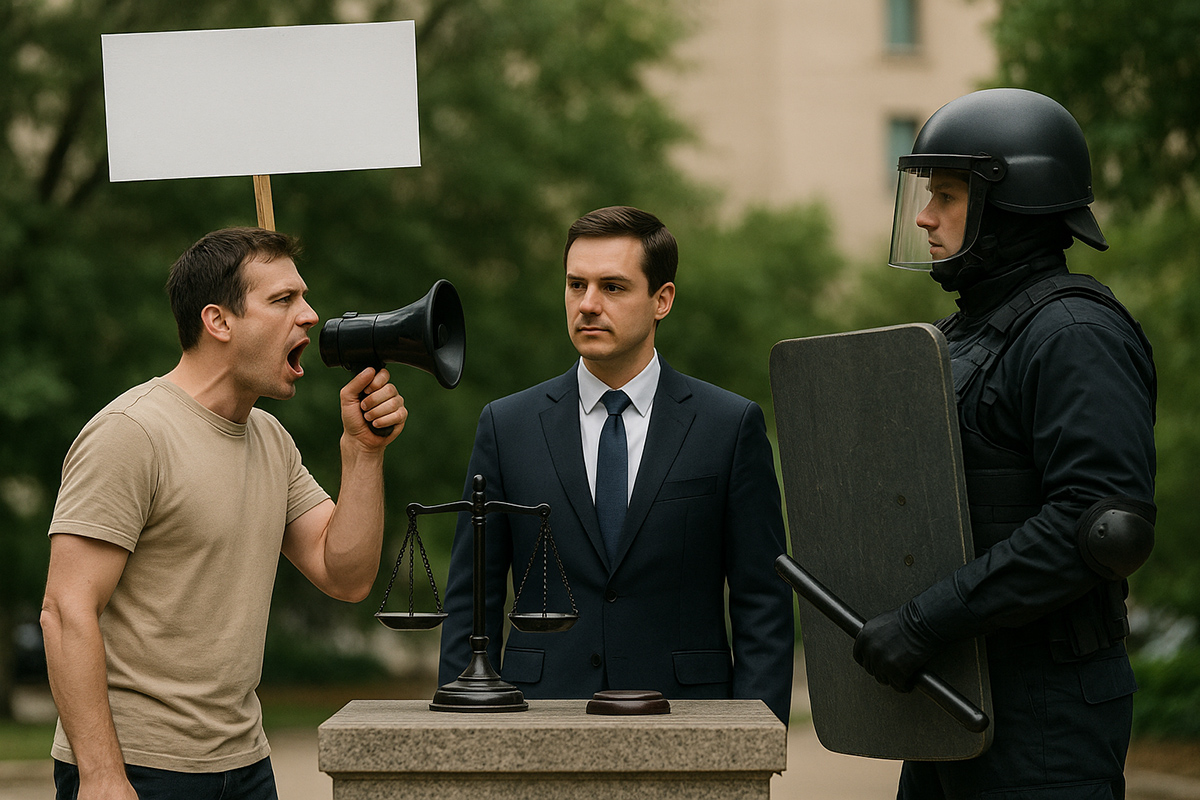Freedom of expression is considered one of the most prominent pillars of modern democracy and one of the fundamental pillars of human rights as recognized by international charters and national constitutions. It is not merely an individual right but a fundamental tool to ensure transparency, accountability, intellectual pluralism, and citizen participation in public life. However, the major paradox lies in the stark contradiction between constitutional texts that guarantee freedom of expression and the practical reality witnessing systematic violations of this freedom.
While many countries’ constitutions adorn texts that elevate this right, explicit or implicit repression is practiced on the ground against every critical or dissenting voice. In this context, this article aims to analyze this paradox and review the most prominent mechanisms of repression that empty the text of its content, highlighting some practical examples.
Freedom of expression is enshrined in Article 19 of the Universal Declaration of Human Rights (1948), which states: “Everyone has the right to freedom of opinion and expression; this right includes freedom to hold opinions without interference and to seek, receive and impart information and ideas through any media regardless of frontiers.” The International Covenant on Civil and Political Rights (1966) confirmed this right in the same article, allowing for certain restrictions only if prescribed by law and necessary to protect public order or the rights of others. Most constitutions in the Arab world and developing countries proclaim freedom of expression as a guaranteed right.
For example, in Egypt, Article 65 of the 2014 Constitution states: “Freedom of thought and opinion is guaranteed.” In Tunisia, Article 31 of the 2014 Constitution states: “Freedom of opinion, thought, expression, media, and publishing is guaranteed, and prior censorship shall not be practiced.” In Iraq, Article 38 of the 2005 Constitution states: “The state guarantees, without prejudice to public order and morals: First—freedom to express opinion by all means.” But the question arises: do these texts translate into actual reality?
On the other hand, restrictive and contradictory legislations give rise to manifestations of repression despite the existence of the text. In many countries, laws restrict freedom of expression on vague grounds such as “threatening national security,” “insulting state institutions,” or “spreading false news.” These laws are used as tools to muzzle voices and are interpreted with excessive flexibility by authorities to criminalize legitimate expression. Authorities also practice various forms of media censorship, whether through direct censorship, control over licenses and funding, or intimidation and imprisonment.
Censorship has also expanded to include the digital space, where personal accounts are monitored, cybercrime laws are used to pursue activists, and public figures, journalists, intellectuals, and civil society activists are prosecuted and imprisoned for opinions published in articles or on social media. Such cases are often tried before non-specialized courts or involve criminal charges unrelated to opinion. Frequently, religion or morality is used as a pretext to restrict expression, especially in matters related to free thought.
The contradiction between text and practice results in loss of trust in institutions. When citizens see constitutional texts unimplemented and the judiciary failing to protect freedom of expression, a general feeling of injustice arises, and the political system loses its moral legitimacy. The shrinking of public space and fear of punishment leads to a decline in free voices and the isolation of social and cultural actors, weakening society’s immunity against tyranny and turning public discourse into an echo of authority’s voice alone. Moreover, intellectual migration or forced silence may occur as restrictions on freedom of expression lead to brain drain, frozen minds, and withdrawal from public affairs either by fleeing abroad or retreating into self-censorship.
In this context, practical examples can be seen. In Turkey, for example, thousands of individuals are prosecuted annually for “insulting the president” under Article 299 of the Turkish Penal Code. In Egypt, hundreds of journalistic websites have been blocked since 2017 without clear judicial rulings. The Anti-Terrorism Law is also used to detain journalists.
To effectively protect freedom of expression, it is necessary to align legislation with international standards. National laws must be reviewed to ensure consistency with international human rights obligations, abolish custodial penalties in publishing and opinion cases, replacing them with fines or civil disciplinary measures when necessary, and guarantee judicial independence so courts can protect freedom of expression without political interference. Also, promoting a culture of dialogue and plurality through education and media is essential to fortify society against hate speech without sliding into repression of opinion.
In conclusion, freedom of expression, no matter how adorned in texts, means nothing if it does not find its way into practical application. The painful paradox is that regimes that flaunt their constitutions as a mark of modernity are the same ones that practice the worst forms of repression in the name of security or order. Human dignity is only achieved when an individual is guaranteed freedom to express opinions without fear, and democracy is only built when voices multiply and opinions intersect. If freedom of expression remains mere ink on paper, then the constitutional text is nothing but a thin veil hiding an ugly authoritarian face.
Dr. Jumana Jassim Al-Asadi, Member of Al-Naba’a Forum for Dialogue, Lecturer at University of Karbala






Comments